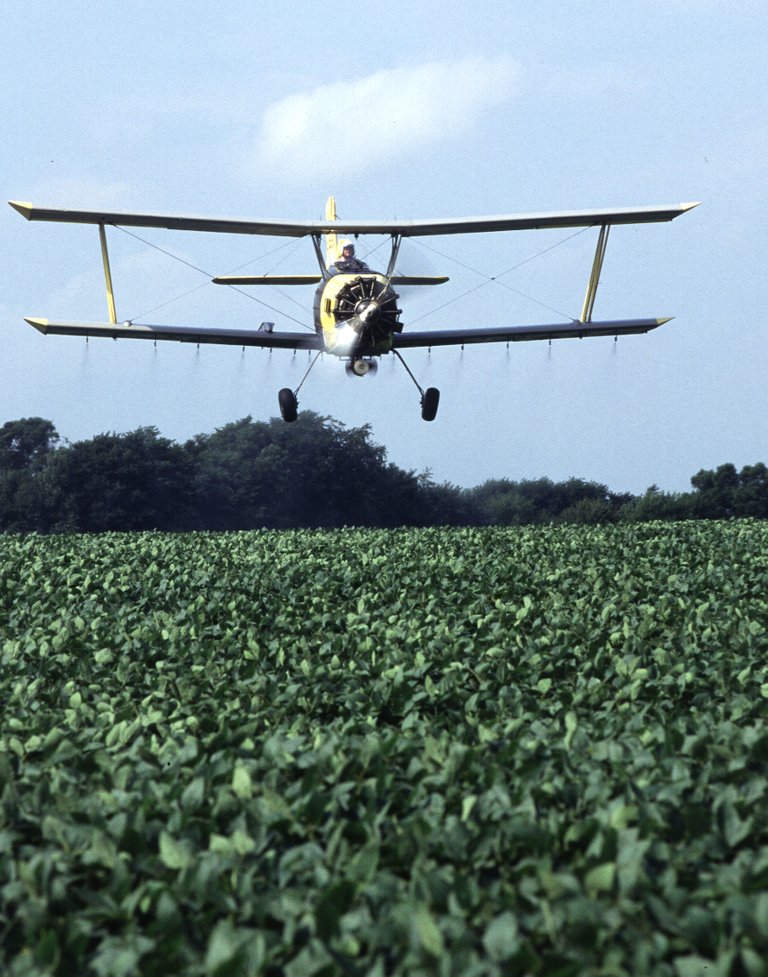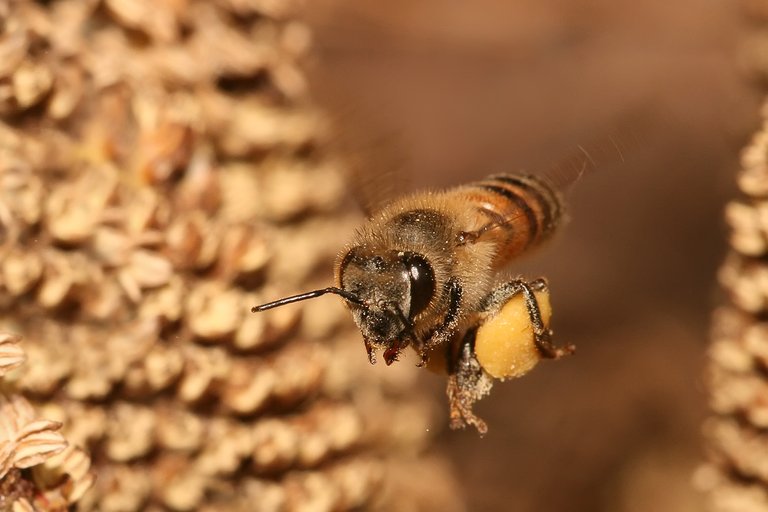Neonicotinoid is a class of insecticide that is the basis for several different brands of insecticides, including imidacloprid – the most common insecticide in the world. It is used in pretty much all parts of the world, including all continents and a lot of different countries. However, it will soon be banned in all of the European Union in order to save the bees!

The chemical structure of imidacloprid. Image is Public Domain.
A closer look at the neonicotinoids
Neonicotinoid is chemically alike the well-known substance nicotine, which is located in cigarettes and other nicotine products (yes, stating the obvious here), and both these chemicals act by binding to the nicotinic acetylcholine receptors found inside your cells. In mammals, these receptors are found in cells in both the central nervous system and peripheral nervous systems, but insects only have them in the central nervous system.
As you might know if you have ever smoked, a low or moderate activation of these receptors lead to nervous stimulation, and you can feel dizzy or even vomit if you “overdose”. However, if you get a real overdose you will experience paralysis, and eventually death! This is of course highly unlikely to happen when you smoke cigarettes, but it is what happens to the insects when they are exposed to neonicotinoids.
It's also worth keeping in mind that the body will gradually get rid of the nicotine that is bound to the receptors in these cells, while the neonicotinoids is bound to these permanently, which means that it will have an additive effect that eventually kills the insect that is exposed to it.
Due to anatomical and chemical differences between insects and mammals, neonicotinoids are generally a lot more dangerous for insects, which is why this pesticide became popular in the first place. However, there’s also a lot of problems with neonicotinoid when used as an insecticide.

A plane that applies insecticide to a field. Image is Public Domain.
Environmental impacts of neonicotinoids
There are a few big impacts from using neonicotinoids as a pesticide. I won't go into the details of each single problem, but it pretty much boils down to these three issues:
Most neonicotinoids are soluble in water, and break down very slowly in the environment. This means that they are a big pollutant, and can also be absorbed into the mass of plants and animals when they drink or absorb water that is filled with neonicotinoid.
Lakes and other masses of water can also potentially store a lot of this toxin for a long time, and thus increase the range of the neonicotinoid.While it’s not that toxic to mammals compared to other insecticides, it is still toxic to a certain degree, and it has a negative effect on both wildlife and aquatic organisms.
The biggest problem in the eyes of the EU is its toxicity on bees. When it was first developed, it was not believed that this insecticide was negative for bees, but during the last few years, evidence showed otherwise. Some even believe that it has a lot to do with the Colony Collapse Disorder (CCD) that is ravaging the honey bee community these days.
Not only is it believed to be responsible for CCD, it is also damaging for the brains of the bees, and it can even make them become addicted!

Image by Muhammad Mahdi Karim, posted with the GNU Free Documentation License, Version 1.2.
The EU is banning all outdoor use of neonicotinoids!
Time to get back to the great news in the title. The European Union has voted for the ban of all outdoor use of neonicotinoids for all the countries that are members, and it will officially be illegal to use it outdoors after the end of 2018. This means that farmers only have 6 months left to use the supplies they already have, and need to find another insecticide to use after this point.
It will still be allowed to use it inside closed greenhouses, since the bees are unlikely to be there anyway.
It is of course uncertain how it will help in the long run, because a lot of concerned people fear that the farmers will simple move to another insecticide that is just as harmful to the environment and the bees.
Neonicotinoids is also used for other purposes, such as getting rid of fleas in farm animals, and this will still be legal. This means that there are still possibilities for neonicotinoids to get into the environment and harm bee colonies, but at least the exposure should be a lot lower in the EU after 2019 begins.
Thanks for reading
Thanks for checking out my post about neonicotinoids and the harm it does to the environment. If you want to learn more about neonicotinoids, check out the Wikipedia page, which is pretty good - or follow some of the links in the text above.
I hope you found the post interesting, and I hope to see you in the comment section below!
About @valth
Hey, I'm @valth - the author of this post. I love to write about nature, biology, animals, nature conservation, ecology and other related branches of science, and I occasionally write about my life, about Steem or about random stuff as well. I'm trying my best to write at least one post every day, so make sure to give me a follow if you enjoy my content and want to see more of it.
Join the @valth community!
I love nothing more than to engage with my readers, so please join the @valth community in the comment section. You will definitely find more information about the topic, personal experiences, questions, and even opposing views down there, so don't miss out on learning more.
I always reward users who post good comments, so please take the opportunity to share your views and get a small upvote in exchange for it.
This is some refreshing news! I feel that there are too many chemical components being used to overcompensate a lack of appropriate nutrients and so forth already. Not that I remember the full science of it, but I learned a while back that healthy plants don't need insecticides. If a plant is healthy and is capable of drawing the correct amount of nutrient from the soil and is living under appropriate conditions, it will live out a normal life cycle of growing and delivering fruit before eventually dying. If, however it isn't a viable life form, it will essentially commit suicide by releasing a phytohormone that attracts insects to bring the plant back into the Earth. It's not that the insects are over-stepping their boundaries, it's actually the sickly plant that is causing the infestation. By using insecticides, we are throwing on a band-aid to a more sinister issue. On top of eating a plant now void of nutrition, we throw in a chemical cocktail
I hope even more restrictions and bans of these components come into play in up-comming years.
That's a very interesting comment, @thegreatlife. I will for sure look more into this information, because it sounds fascinating to learn more about.
I generally agree with you though. We should be a lot more careful about which chemicals we use, and potentially begin to do as much farming as possible with as little insecticide and fertilizers as possible. I guess the big problem is that we don't have enough farm space to feed the entire world right now, so it's not a quick fix, but absolutely something humanity should work together to figure out.
I hope that it is applied as soon as possible and I really hope that there will be controls by authorities on a regular basis.
There are people out there playing to be 'farmers' or 'gardeners', and really do hurt the environment with their lack of knowledge (or lack of willingness to know)Great read @vath.
Thanks!
It's applied at the end of this year, so only around 7 months left :) I'm also excited to see how strictly it will be enforced. Hopefully they will issue a few huge fines so that the rest of the farmers are scared from breaking the new law.
Great news
Plus EU should impose a ban on the import of grains, veggies and fruits from suppliers who use these insecticides...That will further bound many to stay away from using Neonicotinoid.
In these way the overall impact will be on whole world not just EU(especially Asia).
Since Asian continent is a big exporter of raw edibles and lack of regulation/oversight is more of a problem there.
That's a good suggestion!
It would be a lot better if the rest of the world follows, but I think it's rather unlikely that the big Asian countries want to do this, since it will lower their food output.
Great initiative by EU to ban all outdoor use of neonicotinoids at the end of 2018. It will be inevitable for the growth of innocent honey bee which provide honey. Efforts of EU is laudable. Beside banning these pesticides, more scientific development should be made to make pesticide which has minimum affects on people and innocent species. I am not advocate of pesticide usage but may be it's inevitable for attaining high growth of food unfortunately at the cost of environment.
I completely agree with you. Pesticides can be really bad for the environment, but it's better than a famine! However, we should do our best to gradually try to stop using it, or moving to one that is better for the environment and wildlife.
In this way we made better life for our next generation. Hope for the best:)
Great news. Any effort towards cleaner and more natural environment counts. Thanks for pointing this out. Btw, I kind of know you from comments under posts by czechglobalhosts but I didnt know you are into ecology, conservation etc. Always happy to meet another dedicated nature lover here on Steemit :) Keep up the great work.
Thanks! I'm glad you found my content interesting, @phortun.
I do! :) Just followed you not to miss your future posts ;) Have a good day up there in beautiful Norway.
Cool, thanks! I'm glad to have you as a follower :) Have a good day yourself, @phortun.
I have voted for this ban for a few times on different platforms. I don't know if it has helped, but I feel better knowing that in the European Commission there are smart people that understand our priorities in general and not only minding about their business.
As someone else said, refreshing news!
If I remember correctly, the announcement mentions that this ban was wanted by the public, so I think that signing all those petitions actually helped out :)
Bees play a very important Role in the ecosystem. I think this is a very important step in preserving them
Thank you for this post! upvoted and followed. Will be waiting for more cool posts
Yep, absolutely. We're going to be having a big problem if we push the bees to extinction!
Thanks for both the upvote, comment and follow, @anneporter. I'm glad to have you as a reader :)
Good news. I wish they ban all pesticides. When I was kid our garden was full of different species of insect and I was observing many colorful beetles marching through the grass. I have not see a single one recent years.
Yeah, the EU and other developed countries/alliances should definitely ban all pesticides. I get that they want cheaper food, but it's not worth it with the cost the environment has to pay.
I think I once read somewhere about bees being endangered and so I believe this is a good move by the European union. I once read somewhere else about bees responsible for the facilitation of crop growth by pollination. So, I think they are one important species and need to be saved from harm.
Thanks for sharing.
only once? :D It was written everywhere :D
Hehe, yes, it's a pretty common fact to read about these days. But it's also a big concern, so it should be a lot of awareness surrounding it, in my opinion.
Yeah, you are absolutely correct. Bees are vital for crop pollination, and we will have a huge problem if they go extinct!
We really do need to stand against this, as the list of endangered species is increasing day after day. A lot of news are making rounds on the adverse impact of human activities on these lower creatures.
Yep, for sure! A lot of people are actively trying to change our disregard for bees, but it's difficult to get people to listen :(
Well, I just believe the people aware shouldn't stop creating the awareness. Sooner or later, more people will listen.
I agree with you on that point ;)
Well this is good news! Aside from protecting the bees it would also protect us. Pesticides are harmful for our health so banning it would be very beneficial to us too.

Yeah, that's a good point. We humans can of course be exposed to this pesticide from the same sources as the wildlife, so this ban could potentially be very good for the health of humans that live in areas close to farms that use this toxin.
True all of us could benefit from it.
I wouldn't want us to take away the bees that produces the sweet honey.
I commend the EU on this move they are taking to preserving our beloved bees.
Hehe, honey is pretty great! Bees have a much more important ecological role though. Without them we would not have anyone to pollinate a big chunk of the most used agricultural plants, which could potentially lead to a much lower food output.
You are very correct on this.
Bees help prevent food drought.
Yes, exactly. We are going to be in so much trouble if we bring the bees to extinction!
To save the bees in Jamaica a stand had to be taken. These Europeans know the effects and they use it because they have an agenda. They did that with coconuts plants. If they have nothing to get from it they will continue to use it. Your article is interesting.
Thanks, I'm glad you liked my post, @marlenemac. Yes, a stand need to be taken in Jamaica and many other parts of the world!
Great news! At least here EU is spot on. But let's not forget that it's only one of the factors contributing to decline of bee population!
That's a good point. There are many issues that the bees are facing these days, but hopefully this ban will make life a bit easier for them at least.
Bayer & Monsanto will just airdrop that shit over international waters & let the breeze keep blowing it in. They’re so good at killing things, only getting better with practice
I understand your fear. My bet is that they will just find another insecticide that is just as bad as the ones who are banned and use that instead.
Hopefully new trade agreements aren't passed that circumvent the stricter laws places like the EU and Japan have for protecting the health of consumers and the environment, it's funny how long they could deny the effect of this on bees and other wildlife and how hard they tried to astroturf social media and convince everyone that it was safe to use. Glad the EU wised up to their games.
Yep, it's good that the EU did their part and banned it. We will probably see the same fight with a slightly different chemical again soonish, but I guess it will all depend on how the ban is put in place; will be only be for this very specific set of chemicals, or will it be a broad insecticide ban?
It is clearly written on the Cig box that it is injurious to health but still people do smoke :(
I just can't understand this :(
It's ok you don't care for your health, it's up to you :(
but this thing is also killing bees and it should be stoped :(
It's not the nicotine that is actually used for the insecticide, it's just a closely related chemical that functions in the same way. I'm sure there are a lot of issues with the environmental effects from smoking cigarettes, such as plastic waste, but I'm not sure insects dying directly from the smoking is such a problem.
Good post.
It shows that the EU is not all bureaucracy. Some good legislation coming out as well.
Thanks.
Yeah, they make some good changes every once in a while!
There are pesticides that cause major diseases of the human body
Really great article done well
Yeah, it's a big problem for human health a well!
Thanks :)
These bees holds our future as said by Einstein. (No bees, no human race)
And harming them with a puff of cigarette is really a shame. It might not effect the adult individual as it is in low dose but passive smoking within the little childrens are also very harmful. Smoking in front of pregnant women may lead to miscarraige. Nicotine in any form should be banned.Interesting one @valth
Thanks.
Yep, nicotine is very bad, but not as bad as the neonicotinoids. I have no idea how the bees would respond to nicotine, but they would probably be negatively affected by that as well.
The proposal was subject to a vote by member states, and despite concerns by some agricultural producers that the science on the subject of neonicotinoids is flawed and inconclusive, the ban achieved the necessary majority yesterday and will enter into force this year.
Great job with copy+paste.